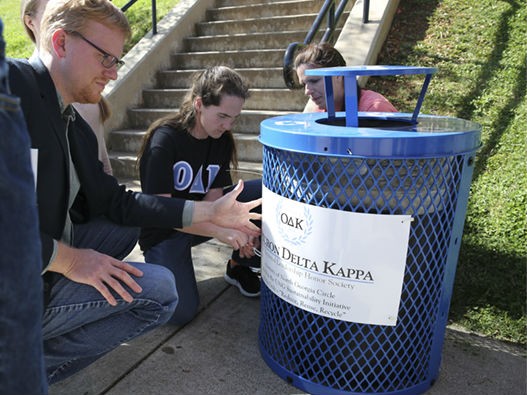University of North Georgia students in Gainesville and Dahlonega are making small changes to reduce their carbon footprint one recycle bin and one water bottle at a time.
UNG’s Gainesville Campus community used water refill stations, preventing the use of 1 million plastic water bottles, according to a project conducted by the Fundamentals of Cartography class.
Student Conrad Moore collected data at the water bottle refilling stations on the Gainesville Campus.
"Over 1 million plastic bottles have been prevented from going into waste in our landfills, Lake Lanier and oceans from the Gainesville campus alone!" said Dr. Jamie Mitchem, professor of geography and Geographic Information Science in the Institute for Environmental and Spatial Analysis (IESA).
During a seven-week period, students living in Donovan Hall on the Dahlonega Campus saved 18,268 plastic water bottles from use, according to a study of nine water bottle refill stations. Since its installation two years ago, the total bottles saved is almost 55,000.
"We calculated that if eight water bottle refill stations were put into the North Georgia Suites, it would cost $6,520," the summary of the study read. "If each Suites resident (598 total) were to buy seven water bottles from the vending machine for $1.75 each, it would equal more than the cost to purchase the fountains ($7,325). This proves each resident using the fountains just seven times would pay off the expense as well as eliminate immense waste."
Students who conducted the study were Sydney Cason, Carson Alday, Jeremy Bemis, and Chris Hesse. They completed the project as part of an environmental science class.
Dr. Justin Ellis said this shows the progress students can make by simply using water bottle refill stations instead of buying bottled water.
"Sustainability is not a big jump," said the director of the Environmental Leadership Center and co-chair of the President’s Committee for Sustainability at UNG. "It's little bitty steps and creating more awareness."
He added the Student Sustainability Club is a key player in the leading initiatives for reusable plastic bottles to encourage more refill stations.
Another small environmentally friendly step UNG is taking is expanding single-stream recycling to outdoor bins on the Dahlonega Campus. In mid-April, the leadership honor society Omicron Delta Kappa purchased 23 recycle bins.
"The goal here is to recycle more and cut down on the mountain of waste sent to the landfill," said Brittaney Dyer, president of Omicron Delta Kappa. "The landfill is only so big."
Dyer, a senior from Blairsville, majoring in criminal justice, explained these recycle single-stream bins are easier to use.
"You can throw several different types of material in one bin," she said.
Ten of the 23 bins have been installed in strategic places across campus to gauge students' response. Ellis said UNG's facilities department worked to determine the high-traffic areas.
The recycle bins are near North Georgia Suites, Health and Natural Sciences, Dining Hall, Price Memorial Hall, between Barnes Hall and Dunlap Hall/Newton Oakes, behind Newton Oakes near the parking lot, the Library/Technology Center, near the drill field in front of Gaillard Hall, and between Gaillard Hall and Donovan Hall.
"The eventual goal of the university is every waste bin will be accompanied by a recycle bin," Ellis said.
This goal is one more objective for the overall sustainability initiatives at UNG, which is spearheaded by the President's Committee for Sustainability, a group tasked with writing UNG's sustainability plan.
"To write a strong plan, we need to heighten engagement and take on few short-range projects to get people taking them on and making them visible," Ellis said.

UNG students with recycle bin. (Courtesy UNG)
http://accesswdun.com/article/2018/6/684116/students-take-steps-in-making-ung-sustainable-campus
